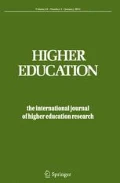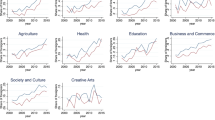Abstract
The article examines the mid-term occupational outcomes of two cohorts of PhDs graduated in 2004 and 2008 in Italy. This comparison allows the authors to explore changing PhD’s occupational prospects after recent academic reforms (e.g. cuts to public funding, introduction of fixed-term positions for assistant professors) and the economic crisis. Population data from the ‘Istat Survey on the Occupational Outcomes of PhD graduates’ is used to analyse PhD’s employability, international mobility, type of contract and occupation 5 years after obtaining a doctoral degree. Empirical results show that academic reforms and the economic crisis coincided with decreasing employment in academia and increasing chances of having a fixed-term contract, being employed abroad and working in research-related occupations outside academia. Moreover, PhD graduates from hard disciplines, such as engineering, are generally better off compared to PhD graduates in soft fields, such as sociology. Finally, the results suggest that the academic reforms reduced the chances to work in academia more in soft rather than in hard academic disciplines.



Similar content being viewed by others
Notes
Data for the expected hirings come from ‘Unioncamere – Ministero del Lavoro, Sistema Informativo Excelsior’. Data from 2012 are available online at http://excelsior.unioncamere.net/index.php?option=com_previsioniarp&Itemid=1611#. Data from 2006 to 2011 were provided in a series of reports titled ‘Gli sbocchi professionali dei laureati nelle imprese italiane’. Data for the number of PhD recipients come from the Italian Ministry of University and Research (MIUR) and are accessible at the following link: http://statistica.miur.it/scripts/postlaurea/vdottori1.asp (data access: 9 February 2017).
It is possible that reforms of the Italian academic system led a growing proportion of PhD holders to pursue an academic career abroad. However, we do not test that argument in this paper.
In the first round (2009), the survey was carried out between December 2009 and February 2010, while in the second round (2014), the survey was carried out between February and July. Therefore, the 2006–2010 cohorts and the 2004–2008 cohorts were surveyed approximately 3 and 5 years after the completion of their doctoral studies, respectively.
Respondents were asked whether their jobs involve research activities ‘mainly’, ‘partly’ or ‘not at all’.
This variable is conditional on being employed, and therefore is only used when analysing outcomes related to contract type, work abroad and type of job.
References
Ackers, L. (2008). Internationalisation, mobility and metrics: a new form of indirect discrimination? Minerva, 46, 411–435.
Argentin, G., & Triventi, M. (2011). Social inequality in higher education and labour market in a period of institutional reforms: Italy, 1992–2007. Higher Education, 61(3), 309–323.
Argentin, G., Ballarino, G., & Colombo, S. (2012). Accesso ed esiti occupazionali a breve del dottorato di ricerca in Italia. Un’analisi dei dati Istat e Stella. Sociologia del Lavoro, 126, 165–181.
Argentin, G., Ballarino, G., & Colombo, S. (2014). Investire in formazione dopo la laurea: il dottorato di ricerca in Italia. AlmaLaurea Working Paper n. 60. AlmaLaurea Inter-University Consortium.
Auriol, L., Misu M., & Freeman R. A. (2013). Careers of doctorate holders: analysis of labour market and mobility indicators. OECD Science, Technology, and Industry Working Papers, 2013/04. OECD Publishing, DOI: https://doi.org/10.1787/5k43nxgs289w-en.
Ballarino, G., & Bratti, M. (2009). Field of study and university graduates’ early employment outcomes in Italy during 1995–2004. Labour, 23(3), 421–457.
Ballarino, G., & Colombo, S. (2010). Occupational outcomes of PhD graduates in northern Italy. Italian Journal of Sociology of Education, 2, 149–171.
Ballarino, G., & Scherer, S. (2013). More investment, less returns? Changing returns to education in Italy across three decades. Stato e Mercato, 33(3), 359–388.
Balmer, B., Godwin, M., & Gregory, J. (2009). The Royal Society and the ‘brain drain’: natural scientists meet social science. Notes and Records of the Royal Society, 63, 339–353.
Beltramo, J., Paul, J., & Perret, C. (2001). The recruitment of researchers and the organization of scientific activity in industry. International Journal of Technology Management, 22, 811–834.
Børing, P., Flanagan, K., Gagliardi, D., Kaloudis, A., & Karakasidou, A. (2015). International mobility: Findings from a survey of researchers in the EU. Science and Public Policy, 42(6), 811–826.
Borrell-Damien, L. (2009). Collaborative doctoral education: university–industry partnerships for enhancing knowledge exchange; doc-careers project. Report for European University Association. Brussels: European University Association.
Campostrini, S. (2011). After the PhD: a study of career paths, job and training satisfaction among PhD graduates from an Italian university. In M. Attanasio & V. Capursi (Eds.), Statistical Methods for the Evaluation of University Systems (pp. 209–222). Heidelberg: Physica.
Cesaratto, S., Avveduto, S., Brandi, M. C., & Stirati, A. (1994). Il brutto anatroccolo. In Il dottorato di ricerca in Italia fra università, ricerca e mercato del lavoro. Milano: Franco Angeli.
CNSVU (2011). Undicesimo Rapporto sullo Stato del Sistema Universitario. Comitato nazionale per la valutazione del sistema universitario. Available at: http://www.cnvsu.it/_library/downloadfile.asp?id=11778 (Last access: 5th July 2017).
Council of Graduate Schools (2007). Data sources: Trends in new Ph.D.s entering academe, 1970 to 2005. CGS Communicator Newsletter 40, no. 2: 4. March 2007. Washington, DC.
Craswell, G. (2007). Deconstructing the skills training debate in doctoral education. Higher Education Research and Development, 26(4), 377–391.
D’Agostino, A., & Ghellini, G. (2011). Labour market outcomes for Ph.D graduates. In M. Attanasio & V. Capursi (Eds.), Statistical Methods for the Evaluation of University Systems (pp. 209–222). Heidelberg: Physica.
Davenport, S. (2004). Panic and panacea: Brain drain and science and technology human capital policy. Research Policy, 33, 617–630.
De Grande, H., De Boyser, K., Vandevelde, K., & Van Rossem, R. (2010). Transitions from academia to industry. How do doctorate holders fit in? Macro and Structural Sociology, Department of Sociology, Ghent University, Working Paper no.10.
Di Cintio, M., & Grassi, E. (2017). International mobility and wages: an analysis of Italian Ph.D. graduates. The Annals of Regional Science, 59(3), 759–791.
Diamond, A., Ball, C., Vorley, T., Hughes, T., Moreton, R., Howe, P., & Nathwani, T. (2014). The impact of doctoral careers. Final Report, CFE Research, Leicester.
Enders, J. (2002). Serving many masters: the PhD on the labour market, the everlasting need of inequality, and the premature death of Humbolt. Higher Education, 44, 493–517.
Enders, J. (2004). Research training and careers in transition: a European perspective on the many faces of the Ph.D. Studies in Continuing Education, 26, 419–429.
Ermini, B., Papi, L., & Scaturro, F. (2017). An analysis of the determinants of over-education among Italian Ph.D graduates. Italian Economic Journal, 3(2), 167–207.
Fernandez-Zubieta, A., Geuna, A., & Lawson, C. (2015). What do we know of the mobility of research scientists and impact on scientific production. In A. Geuna (Ed.), Global mobility of research scientists. The economics of who goes where and why (pp. 1–33). San Diego: Elsevier Academic Press.
Franzoni, C., Scellato, G., & Stephan, P. (2012). Foreign-born scientists: mobility patterns for 16 countries. Nature Biotechnology, 30, 1250–1253.
Gaeta, G. L. (2013). Matching advanced studies to the skills required for work: the case of PhD. Graduates in Italy. Economia dei Servizi, 8(2), 177–188.
Garcia-Quevedo, J., Mas-Verdú, F., & Polo-Otero, J. (2012). Which firms want PhDs? An analysis of the determinants of the demand. Higher Education, 63(5), 607–620.
Giret, J. (2005). The theory of employment: The professional debut young PhDs. Marseilles: Centre for Studies and Research on Qualifications.
Godwin, M., Gregory, J., & Balmer, B. (2009). The anatomy of the brain drain debate, 1950–1970s: Witness seminar. Contemporary British History, 23, 35–60.
Hancock, S., & Walsh, E. (2016). Beyond knowledge and skills: rethinking the development of professional identity during the STEM doctorate. Studies in Higher Education, 41(1), 37–50.
Haynes, K., Metcalfe, J., & Videler, T. (2009). What do researchers do? First destinations of doctoral graduates by subject. London: Careers Research and Advisory Centre.
Istat (2012). The system of Italian enterprises: competitiveness and growth potential. Istituto Nazionale di Stat http://www.istat.it/it/files/2013/07/Chapter-2.pdf. (Last access: 5th July 2017).
Jones, M. (2013). Issues in doctoral studies—forty years of journal discussion: where have we been and where are we going? International Journal of Doctoral Studies, 8, 83–104.
Kahn, L. M. (2010). Employment protection reforms, employment and the incidence of temporary jobs in Europe: 1996–2001. Labour Economics, 17(1), 1–15.
Kehm, B. M. (2006). Doctoral education in Europe and North America: a comparative analysis. Wenner Gren International Series, 83, 67–78.
King, D. (2008). Doctoral graduates in Canada: findings from the Survey of Earned Doctorates, 2004/2005. Ottawa: Minister of Industry. Statistics Canada.
Lee, H. F., Miozzo, M., & Laredo, P. (2010). Career patterns and competences of PhDs in science and engineering in the knowledge economy: the case of graduates from a UK research based university. Research Policy, 39(7), 869–881.
LERU (2007). Doctoral studies in Europe: excellence in researcher training. League of European Research Universities. Available at: https://www.madrimasd.org/empleo/documentos/doc/Doctoral_studies_Europe_excellence.pdf. (Last access: 19 April 2017).
LERU (2010). Doctoral degrees beyond 2010: training talented researchers for society, League of European Research Universities. Available at: http://www.leru.org/files/publications/LERU_Doctoral_degrees_beyond_2010.pdf (Last access: 19 April 2017).
Mahroum, S. (2000). Highly skilled globetrotters: mapping the international migration of human capital. R&D Management, 30, 23–32.
Mangematin, V. (2000). PhD job market: professional trajectories and incentives during PhD. Research Policy, 29, 741–756.
Mason, G., & Nohara, H. (2010). How well-rewarded is inter-firm mobility in the labour market for scientists and engineers? New evidence from the UK and France. Economics of Innovation and New Technology, 19(5), 459–448.
Mowbray, S., & Halse, C. (2010). The purpose of the PhD: theorising the skills acquired by students. Higher Education Research & Development, 29(6), 653–664.
Neumann, R., & Tan, K. K. (2011). From PhD to initial employment: the doctorate in a knowledge economy. Studies in Higher Education, 36(5), 601–614.
Neumann, R., Kiley, M. & Mullins G. (2008). Australian doctoral graduates: where are they going. In M. Kiley and G. Mullins (Eds.), Quality in postgraduate research: Research education in the new global environment (pp. 84–89). Conference Proceedings of the 2008 Quality in postgraduate research conference, April 17–18, in Adelaide, South Australia.
Passaretta, G., Barbieri, P., Wolbers, M. H. J., & Visser, M. (2018). The direct effect of social origin on men’s occupational attainment over the early life course: an Italian-Dutch comparison. Research in Social Stratification and Mobility, 56, 1–11.
Paul, J., & Perret, C. (1999). PhD graduates in France: training, careers and policy issues. In O. Kivinen, S. Ahola, & P. Kaipainen (Eds.), Towards the European model of postgraduate training (pp. 157–186). Turku: Research Unit for the Sociology of Education.
Reimer, D., Noelke, C., & Kucel, A. (2008). Labor market effects of field of study in comparative perspective: An analysis of 22 European countries. International Journal of Comparative Sociology, 49(4–5), 233–256.
Stirati, A., & Cesaratto, S. (1995). The Italian Ph.D. ten years on: Educational, scientific and occupational outcomes. Higher Education, 30(1), 37–61.
Thomson, P., & Walker, M. (2010). Doctoral education in context. The changing nature of the doctorate and doctoral students. In P. Thomson & M. Walker (Eds.), The Routledge doctoral student’s companion (pp. 9–26). New York: Routledge.
Toscano, E., Coin, F., Giancola, O., Grüning B., & Vitucci, F. (2014). RICERCARSI. Indagine sui percorsi di vita e lavoro del precariato universitario, FCG-CGIL. Available at: https://www.academia.edu/11162215/Ricercarsi._Indagine_sui_percorsi_di_vita_e_lavoro_del_precariato_universitario. (Last access: 14th July 2017).
Triventi, M., Panichella, N., Ballarino, G., Barone, C., & Bernardi, F. (2016). Education as a positional good: Implications for social inequalities in educational attainment in Italy. Research in Social Stratification and Mobility, 43, 39–52.
Ulivieri, S. (2009). Riflessioni su passato, presente e futuro del Dottorato di ricerca. In M. L. Iavarone (Ed.), Alta formazione per lo sviluppo educativo locale (pp. 33–40). Napoli: Liguori.
Author information
Authors and Affiliations
Corresponding author
Rights and permissions
About this article
Cite this article
Passaretta, G., Trivellato, P. & Triventi, M. Between academia and labour market—the occupational outcomes of PhD graduates in a period of academic reforms and economic crisis. High Educ 77, 541–559 (2019). https://doi.org/10.1007/s10734-018-0288-4
Published:
Issue Date:
DOI: https://doi.org/10.1007/s10734-018-0288-4



